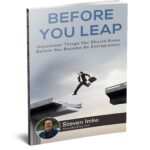As we discussed in the Anatomy of a Business Owner, most self-employed, micro, and lifestyle businesses are started by a person with a strong technical persona. Often, these entrepreneurs are suddenly seized with the desire to start their own businesses because of their strong technical skills. Michael Gerber, the author of “The E-Myth,” describes this sudden desire to start a business as having an entrepreneurial seizure.
This entrepreneurial seizure causes the business owner to get excited about starting their own business and about being their own boss. However, as with all seizures, this excited and elevated brain activity soon returns to the status quo. The technical person then realizes that the technical activities themselves are what truly excites them, not the planning and coordination required by small business owners.
Unfortunately, many new business owners come to this realization after they have already taken the leap. Since they have already expended considerable time and treasure, reversing course is often difficult. These owners toil for months and even years trying to keep their business afloat long after their excitement has died. Eventually, they rue the day they took the leap to start their own business. They’ve completely upended their lives all because someone said to them,
“You have such great technical skills! You should stop working for the man and go into business for yourself.”
Several years ago I purchased some property on Chesapeake Bay in Virginia. The lot was subdivided into 3 building lots and I hired Tom, a general contractor recommended by my realtor, to start building spec homes on the lots. Tom was a great technician and built me a wonderful spec home. However, his technical persona dominated. His president and CEO personas were almost completely dormant. It was a shame since he was such a wonderful technician and really knew what it took to build a great property.
During our working relationship that spanned several properties, I tried to coach him many times. Tom knew he needed to give more control to his president and CEO personas, but when push came to shove, it was the technical persona that won time and time again.
Rather than focusing on higher-level responsibilities such as figuring out how to avoid waste or selling the next job before the current job was done, he would frequently show up at the job site, roll up his selves, and go to work with his crew. His record-keeping was atrocious, which caused him to borrow money from one job to pay for another. Soon he lost his contractor’s license.
Rather than just returning to being a great employee, he decided to coach his wife to pass her contractor’s license and re-birthed his company under her license. However, this new company also suffered from the same fundamental issues. Finally, a heart attack made him realize he was not cut out for being an employer.
I think most books written about starting a small business get it wrong on this point. They focus on the process of ideation and what it takes to start and build a business. Yet, they should first focus on whether or not the entrepreneur has the skills and desires needed to leave the world of being an employee and becoming an employer.
Before taking the leap, I advise my clients to dig down deep and do a little self-reflection to determine why they really want to leave the world of employment and enter the world of business ownership. The reality of the work is very different when one crosses the chasm that separates the worker from the business owner.
For people with the desire to be a business owner, but lack many of the fundamental skills necessary to design the new business systems, there is hope. Rather than starting from scratch and trying to design their own system, as most people do, they can simply buy the system from someone else.
When you buy someone else’s business or you buy a franchise, you are buying a business in a box. Assuming the business model is successful, you have a good foundation and a head start to making your business a success.
With a franchise, it is mostly about execution since you have no ability to change the model in any way. Much of the CEO work is performed by the franchiser and employees do the technical work. Therefore, if you are president persona-centric, a franchise concept makes the most sense for you.
When you buy someone else’s business you start with an existing system that hopefully has operated with some level of success. However, you are free to modify or change course as you see fit. Therefore, if you enjoy the work associated with the president persona most but also have the skills associated with the CEO persona, buying an existing business makes sense for you.
When you start a new business from scratch, you start with a blank slate. Not only must you design and manage all the internal systems, but above all else, you must make sure your new business is aligned with the needs of the outside world. Therefore, if you really enjoy the more strategic-focused work associated with the CEO persona, yet also have the management skills associated with the president, then starting a business from scratch is an option for you.
Finally, if you really love doing the core work of the technical persona and derive most of your satisfaction from doing a superior job, remaining an employee is your best option.
In the end, it is about your ability to recognize in yourself the persona that you are good at and enjoy most. Then you choose the right path for you. Do not let outsiders, ignorant of what it takes to be successful in business, convince you to take a wrong turn and head down a path that’s not right for you.
What personas dominate you and what path of business ownership makes the most sense for you to follow?

Related Book: Before You Leap is a wisdom-packed book that was written for the nascent entrepreneur. It uses stories and personal examples from the author to reveal uncommon things that can make or break your venture before it starts. The book not only gives the entrepreneur the tools for self-reflection but also exposes readers to money-making options to building a full-blown business around their idea.












